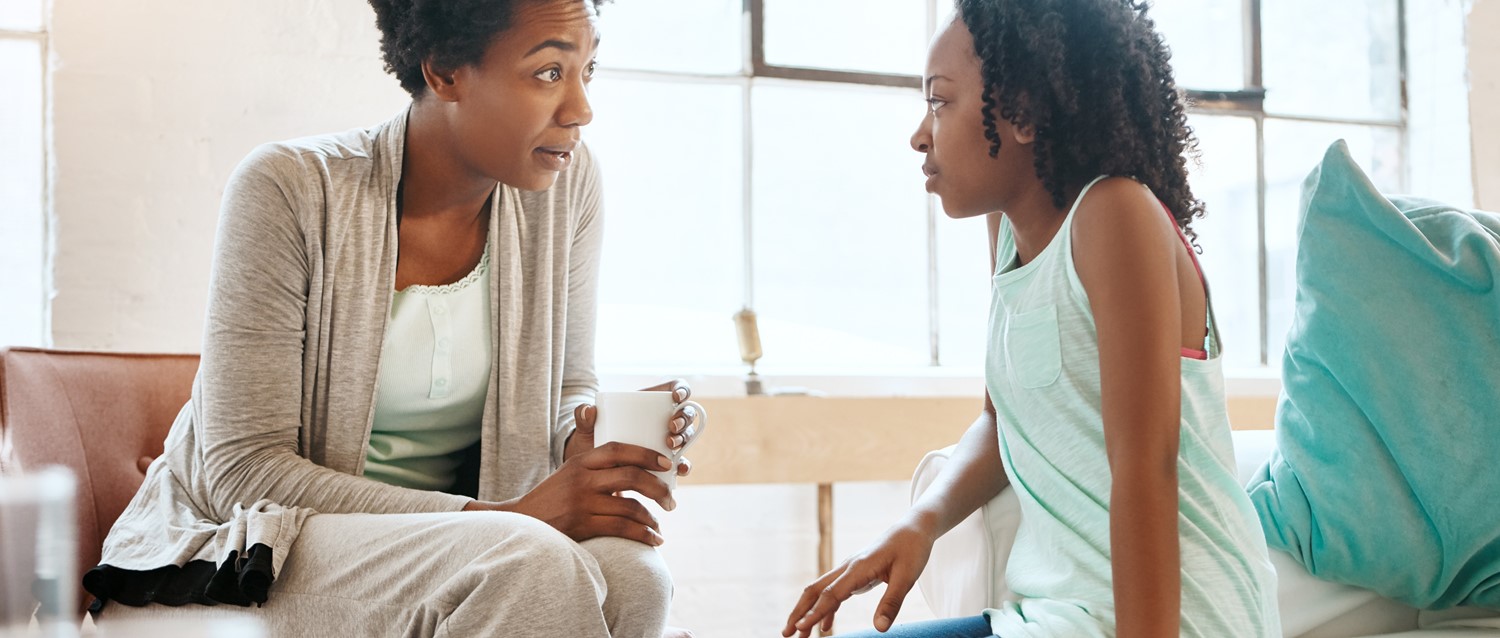
How to talk to your kids about sex, porn and healthy relationships
Peer reviewed by Dr Sarah Jarvis MBE, FRCGPLast updated by Lydia SmithLast updated 21 May 2018
Meets Patient’s editorial guidelines
- DownloadDownload
- Share
- Language
- Discussion
Parents expect to have tricky conversations with their kids, whether it's 'where babies come from' or how to navigate a safe, sexual relationship as a young adult. But with children exposed to online pornography at an increasingly early age, parents are having to grapple with discussions about what their kids have clicked on and seen.
Talking about porn and what a healthy relationship looks like isn't always easy but it is important - because the cost of staying quiet can be high.
In this article:
Video picks for Parenting
Natalie Collins, a mother of three, is a speaker and trainer on gender issues who created an online resource called Creepy Naked Stuff to help parents talk to their kids about pornography.
She says she talks to her children about porn and healthy relationships. "It's important that every child is educated about pornography before they see it," she explains.
"They need to know that they need to tell someone if they see that stuff, because what we find is young people are likely to come across pornography and, when they do, they don't have a way of talking to anyone about it."
The problem with porn
We might have rigorous parental controls on devices, but children are likely to access online porn no matter our attempts to shield them from it. A 2016 study by Middlesex University found nearly all children - 94% - had seen it by age 14.
Like films and TV programmes, porn is fictional and rarely a true representation of what sex is like or how relationships work - but children might not realise this. As a result, they may see it as realistic and feel under pressure to have 'porn-like' sex.
Middlesex University researchers, for example, found more than a third of 13- to 14-year-olds wanted to copy the behaviour they viewed, despite more than three quarters of respondents agreeing porn did not help them understand consent.
"Often porn doesn’t show consent, safer sex or using condoms," says Bekki Burbidge, deputy chief executive for the sexual health charity FPA.
"Any discussion about what’s going to happen, and what people are OK with, often happens off-screen. And actors in porn can look very different to most people, which might feed into insecurities about appearance."
Graphic violence
Back to contentsThe content of mainstream porn has become increasingly graphic and violent in nature. An analysis of the 50 best-selling adult films in 2010 found that of 304 scenes examined, nearly half contained verbal aggression and more than 88% contained physical aggression - mostly targeting women and perpetrated by men.
Viewing porn repeatedly may desensitise children to such violence and without being taught what a healthy, respectful relationship is, uninformed viewers risk seeing porn as a source of information about intimacy.
"If your children understand what a healthy and happy relationship looks like, they’re more likely to be able to avoid unhealthy or abusive situations themselves," says Burbidge. "And if your children know they can talk to you about these kinds of topics, they'll be more likely to ask for your help if they need it.
"Try to get into the habit of discussing growing up, friendships, relationships and sex from an early age. This makes the more challenging topics, such as what a healthy sexual relationship looks like, easier to broach when the time comes."
Continue reading below
How to speak to your children about porn
Back to contentsKeep the conversation going
For Collins, it's not just about having one, awkward chat about porn, but creating an open environment where children can talk about any topic.
"My experience has been that if you are totally open and really out there with it, it actually becomes a lot less weird and it becomes a lot easier to have those conversations," she says.
Keep it appropriate
The FPA recommends asking your child's school about what information they are giving at what age, so you can reinforce important messages. It's important not just to leave it for the school, though - and if your child asks a question about something, it's normally a sign they are old enough for an answer.
Avoid confrontation
It's best to avoid approaching a conversation about porn with your child in a confrontational way. Instead, you could try using TV or films to open a conversation free of judgement or guilt.
"You could bring up subjects when the opportunity arises, such as seeing something on television or hearing it on the radio or in music," Burbidge says.
"You could also talk about how your child feels about topics like porn and sexting, or ask what their friends say about it. Talking about the subject more broadly will help separate it from your child's personal sexual feelings or thoughts - or your own."
Play with language
Collins recommends introducing the topic by talking about words that sound the same, but have different meanings. For example, you can talk about the different meanings of 'pawn' and 'porn' as a lead-in to the conversation.
"It might be like: 'What kind of words can you think of that have more than one meaning?' There are ways you can build literacy around it," Collins says. "As they get a bit older, it allows them to start to have those conversations."
Third person
Talking in the third person can make the conversation easier, according to the sex and relationships advice website Bish UK. You could try bringing up issues surrounding porn, too - for example: 'Lots of people think porn is harmful, why do they think that?'
Explain dangers
When your child is old enough to have access to their own technology, sit down together and make rules about how or when to use it.
Explain that there may be things they see online that aren't safe and use this as a lead-in to talk about pornography, alongside other online risks.
Explain what healthy relationships look like
In a general way, explain that healthy relationships are built on trust, openness and being able to communicate well. It's normal for couples to disagree about something or to argue, but anger needs to be controlled and violence is never acceptable.
Respect is the sign of a good relationship and it isn't OK to be pressured into doing something you don't want to or that makes you feel uncomfortable.
Use resources
There are some great online resources available to help parents deal with difficult conversations.
"It can often be a surprise when you realise your child is growing up, and might be developing sexual desires. But it's a perfectly normal part of their transition to adulthood. You might find Brook's Traffic Light Tool useful, to help identify which behaviours can be expected at different ages," Burbidge says.
The FPA created the Speakeasy course for parents and carers to feel confident talking to their children about growing up, sex and relationships. The website Bish UK also provides tips and advice for parents.
Patient picks for Parenting

Healthy living
How to deal with empty nest syndrome at Christmas
When the kids aren't home for Christmas, it's not easy. The festive season is often seen as a time for family and friends, with back-to-back TV adverts showing people tucking into turkey dinners and enjoying mince pies together. So when you're home alone without extended family, things can seem too quiet - making what should be a joyous time feel lonely.
by Lydia Smith

Healthy living
How to talk to your kids about sex, porn and healthy relationships
Parents expect to have tricky conversations with their kids, whether it's 'where babies come from' or how to navigate a safe, sexual relationship as a young adult. But with children exposed to online pornography at an increasingly early age, parents are having to grapple with discussions about what their kids have clicked on and seen. Talking about porn and what a healthy relationship looks like isn't always easy but it is important - because the cost of staying quiet can be high.
by Lydia Smith
Continue reading below
Article history
The information on this page is peer reviewed by qualified clinicians.
21 May 2018 | Latest version

Ask, share, connect.
Browse discussions, ask questions, and share experiences across hundreds of health topics.

Feeling unwell?
Assess your symptoms online for free
Sign up to the Patient newsletter
Your weekly dose of clear, trustworthy health advice - written to help you feel informed, confident and in control.
By subscribing you accept our Privacy Policy. You can unsubscribe at any time. We never sell your data.